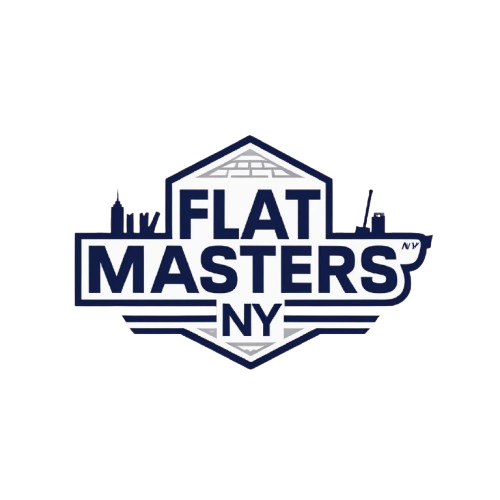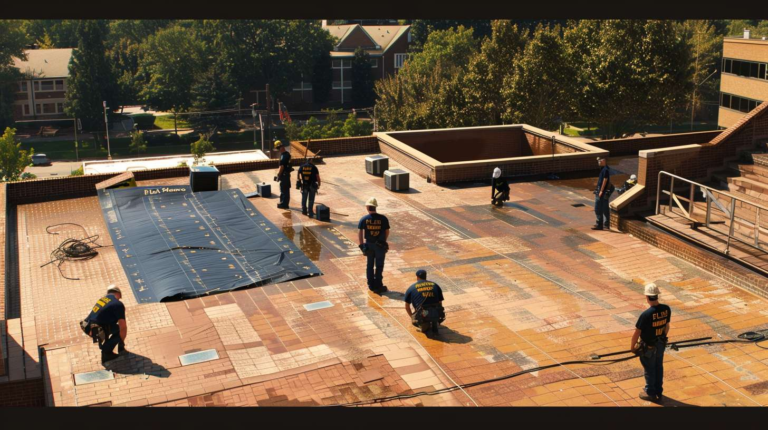Are Flat Roofs Good? 5 Key Factors Every Homeowner Should Know
Look, I get this question at least three times a week here in Queens. Are flat roofs good? The short answer is yes - when they're done right and maintained properly. But like most things in roofing, there's more to the story than a simple yes or no.
After installing and repairing flat roofs across Queens for over two decades, I've seen the good, the bad, and the downright ugly. Last month alone, we handled twelve flat roof projects from Astoria to Bayside, and each one had its unique challenges and benefits. Here's what every homeowner needs to understand before making this decision.
1. Drainage is Everything - And I Mean Everything
Here's the thing about flat roofs that most people don't realize until it's too late: they're not actually flat. A proper flat roof has a slight slope - typically 1/4 inch per foot - to direct water toward drains or gutters. Is it good to have a flat roof without proper drainage? Absolutely not. You'll have ponding water, and that's when your problems start multiplying faster than you can fix them.
I can't tell you how many times I've been called out to a property where the previous contractor installed what they called a "flat" roof that was actually dead level. Water sits there like a swimming pool. Within two years, you're looking at membrane deterioration, leaks, and potentially structural damage.
We always install tapered insulation systems on our projects. It adds to the upfront cost - usually around $2-4 per square foot more - but it prevents thousands in water damage down the road. My crew chief Miguel always says, "Water finds a way," and he's right. Give it somewhere to go, or it'll make its own path through your roof.
2. Material Choices Make or Break Your Investment
So what's really the best flat roof material? Depends on your budget, building type, and how long you plan to stay in the property.
EPDM (rubber membrane) is popular for residential applications. It's relatively affordable at $4-8 per square foot installed, and when properly maintained, can last 20-25 years. We've had good success with Firestone and Carlisle products in the Queens climate.
TPO (thermoplastic polyolefin) is what we recommend for most commercial applications and some residential projects. Costs run $5-10 per square foot, but the energy savings from its reflective surface can offset that premium over time. Plus, it handles our freeze-thaw cycles better than EPDM.
Modified bitumen is still king for durability in my book. Yes, it's more expensive upfront - $6-12 per square foot - but I've got modified bitumen roofs I installed fifteen years ago that are still performing like new. The torch-applied systems we use create an incredibly strong, monolithic membrane.
The Real Cost Breakdown Nobody Talks About
When people ask is a flat roof a good idea financially, I always break down the total cost of ownership, not just installation. Here's what a typical 1,500 square foot flat roof replacement runs in Queens:
- Basic EPDM system: $8,000-$15,000
- TPO with proper insulation: $12,000-$18,000
- Modified bitumen premium system: $15,000-$25,000
- Annual maintenance (recommended): $300-$600
- Major repairs every 10-15 years: $2,000-$5,000
But here's what most contractors won't tell you: the installation cost is just the beginning. A flat roof requires more attention than a sloped roof. We recommend annual inspections and cleaning, especially after our brutal Queens winters. Ice dams, debris accumulation, and membrane stress from temperature cycling - it all adds up.
3. Weather Reality Check for Queens Properties
Are flat roofs safe in our climate? They can be, but you need to understand what you're signing up for. The salt air from the East River and Long Island Sound accelerates membrane aging. Our freeze-thaw cycles are particularly hard on flat roof systems - water expands in small cracks and tears, creating bigger problems by spring.
I've noticed flat roofs on the north side of buildings in Astoria and Long Island City take more of a beating than those with southern exposure. Less sun means slower snow melt, more ice formation, and longer periods of standing water. It's not a deal-breaker, but it means more frequent maintenance.
Snow loading is another consideration most homeowners don't think about. That blizzard we had three winters ago? I got forty-two calls in one week from flat roof owners worried about structural damage. Most were fine, but it's stress you don't get with a steep-slope roof where snow slides off naturally.
4. The Energy Efficiency Question
Here's where flat roofs can really shine, especially with today's energy costs. A properly insulated flat roof with a reflective membrane can significantly reduce cooling costs. We typically install R-20 to R-30 insulation, and the white TPO or EPDM surface reflects heat rather than absorbing it like traditional dark shingles.
Last summer, a client in Elmhurst saw a 30% reduction in their cooling bills after we replaced their old built-up roof with a white TPO system. The payback period on the energy savings alone was about eight years. Not bad, considering the roof should last twenty-five years with proper care.
But - and this is important - those energy benefits disappear if you don't maintain the reflective surface. Dirt, algae, and debris accumulation can cut reflectivity in half. Annual cleaning isn't optional if you want to keep those energy savings.
5. Maintenance Reality - What You Need to Know
Look, I don't care what other contractors say about "maintenance-free" flat roofs. They don't exist. Is a flat roof good for homeowners who don't want ongoing maintenance? No, it's not. You need to stay on top of several things:
Drain cleaning is critical - we recommend it twice yearly, spring and fall. Leaves, debris, even tennis balls from neighboring courts can block drainage systems. A clogged drain means standing water, and standing water means problems.
Membrane inspection should happen annually. Small punctures from HVAC work, satellite installations, or even hail damage need immediate attention. A $50 repair can prevent a $5,000 leak if caught early.
Seam integrity around penetrations - vents, chimneys, HVAC units - needs regular checking. The thermal expansion and contraction in Queens' climate puts stress on these connections. We use high-quality sealants, but they still need periodic renewal.
When Flat Roofs Make Perfect Sense
Despite the maintenance requirements, there are situations where flat roofs are absolutely the right choice. Multi-story buildings where roof access is needed for HVAC equipment. Properties where you want to create usable outdoor space - rooftop gardens, decks, or just additional square footage. Commercial buildings where the cost per square foot advantage really adds up.
We just finished a beautiful rooftop deck project in Forest Hills where the homeowner gained 800 square feet of usable space. The structural engineering and waterproofing were complex, but the result is stunning. That's something you can't do with a steep-slope roof.
For buildings with parapet walls, flat roofs often make more architectural sense than trying to create complex transitions to sloped sections. And if you're planning solar panel installation, flat roofs offer more flexibility for optimal panel placement and maintenance access.
The Bottom Line on Flat Roofs
So are flat roofs good? They're good for the right application, with the right installation, and with committed maintenance. They're not a set-it-and-forget-it solution like some contractors suggest. But when properly designed and maintained, they offer unique benefits in terms of cost, space utilization, and energy efficiency.
The key is working with a contractor who understands flat roof systems inside and out. At Flat Masters NY, we've been specializing in flat roofing across Queens for over twenty years. We don't just install - we educate our clients on proper maintenance and provide ongoing support to protect their investment.
If you're considering a flat roof for your Queens property, give us a call at (917) 994-7618. We'll assess your specific situation, explain your options, and help you make an informed decision. Because the question isn't really whether flat roofs are good - it's whether a flat roof is right for your specific needs and circumstances.


